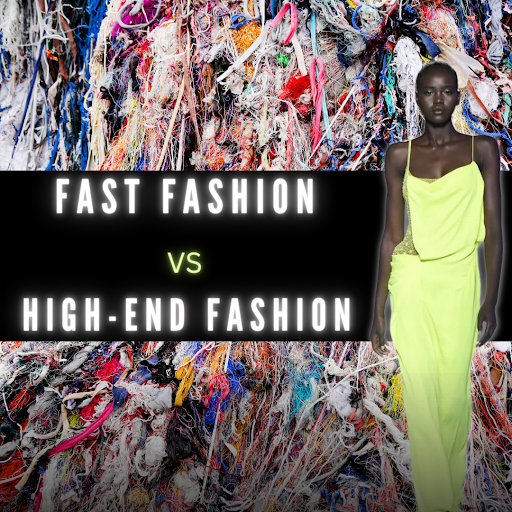A continuous conversation has been held on a constant basis which is the idea of Fast Fashion vs. High-End Fashion. Many people prefer how they shop for clothing items based on all sorts of things, including affordability, material, sustainability, and so much more. Just as everything in the world is constantly evolving, the fashion world is as well – especially today trying to keep up with the latest trends. Regardless of how you shop, rather it be fast fashion or luxury fashion, they both relatively have the same issues in more ways than one.
Since the first part of the 21st century, Fast Fashion has transitioned from a product-driven concept to a manufacturing machine today. Fast Fashion is a term used to describe a highly profitable and exploitative business model while disregarding quality, originality, fair wage, and sustainability. It derived from the brand Zara when it first landed in New York at the beginning of the 1990s. Zara’s primary mission was to take only 15 days for a garment to go from the design stage to being sold in stores. Fast Fashion has spread worldwide and continuously brings up an ongoing debate and discussion regarding its ethics and contribution to the fashion world. The issues with Fast Fashion lie in the impact on the environment and the poor work labor behind most of these companies manufacturing it.
Fast Fashion contributes to waste consumption, as it is estimated that 85% of all clothing ends up in landfills. Most of the clothing produced is from low-quality materials that aren’t healthy for the environment when thrown away. Just as the materials aren’t fit for the environment, the poor use of synthetics/nylons and all types of low-quality fabrics are unsuitable for those working endlessly in the workshops to produce the consumer’s needs. Compared to developed nations such as the United States and Canada they often turn a blind eye to what happens in these sweatshops. Child labor, inhumane wages, trafficking, and horrific work conditions are all part of the greatest atrocities in Fast Fashion.
Luxury Brands have their fair share of deposition and everything that glitters is not gold. Luxury sales have increased rapidly throughout the past decade as more people are now engaging and purchasing luxury goods. While luxury brands build the perception of having the highest quality of clothing, what goes into making these items is similar to Fast Fashion. Most fashion houses are sophisticated marketing machines, as luxury is a perception. Some fashion brands/houses sell a fantasy to appeal to consumers who want to make people buy their products for the name and brand. As some designers create their products, many High-End Fashion brands have poorer-class citizens working continuously in sweatshops in similar conditions to those working in Fast Fashion branded sweatshops. High-End luxury brands are also unethical and contribute to environmental waste as most brands will burn and dispose of their products and materials due to minor imperfections of the garments. Luxury brands aren’t selling clothing, they sell lifestyle and social status to those willing to purchase.
